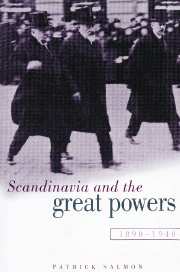Book contents
- Frontmatter
- Contents
- List of tables
- Preface
- Definitions
- List of abbreviations
- Map 1 Scandinavia and the Baltic 1939
- Map 2 The Gulf of Finland
- Map 3 Entrances to the Baltic
- Introduction
- 1 The end of isolation: Scandinavia and the modern world
- 2 Scandinavia in European diplomacy 1890–1914
- 3 The war of the future: Scandinavia in the strategic plans of the great powers
- 4 Neutrality preserved: Scandinavia and the First World War
- 5 The Nordic countries between the wars
- 6 Confrontation and co-existence: Scandinavia and the great powers after the First World War
- 7 Britain, Germany and the Nordic economies 1916–1936
- 8 Power, ideology and markets: Great Britain, Germany and Scandinavia 1933–1939
- 9 Scandinavia and the coming of the Second World War 1933–1940
- Epilogue
- Bibliography
- Index
9 - Scandinavia and the coming of the Second World War 1933–1940
Published online by Cambridge University Press: 11 November 2009
- Frontmatter
- Contents
- List of tables
- Preface
- Definitions
- List of abbreviations
- Map 1 Scandinavia and the Baltic 1939
- Map 2 The Gulf of Finland
- Map 3 Entrances to the Baltic
- Introduction
- 1 The end of isolation: Scandinavia and the modern world
- 2 Scandinavia in European diplomacy 1890–1914
- 3 The war of the future: Scandinavia in the strategic plans of the great powers
- 4 Neutrality preserved: Scandinavia and the First World War
- 5 The Nordic countries between the wars
- 6 Confrontation and co-existence: Scandinavia and the great powers after the First World War
- 7 Britain, Germany and the Nordic economies 1916–1936
- 8 Power, ideology and markets: Great Britain, Germany and Scandinavia 1933–1939
- 9 Scandinavia and the coming of the Second World War 1933–1940
- Epilogue
- Bibliography
- Index
Summary
The strategic plans produced by the great powers before the First World War were abstract, ambitious and largely unrealistic. When British, German and Soviet strategists returned after 1933 to consider the role of Scandinavia in a future war, they did so in the light of experience which their predecessors had lacked. There appear to have been no serious examinations of the possibility of military operations on Scandinavian territory of the kind which loomed so large in pre-1914 deliberations. The primary focus was on economic and naval warfare. For both Great Britain and Germany, the lesson of the last war was that economic pressure on Germany had been of decisive importance. Moreover, in the light of Germany's territorial losses after Versailles and the exploitation of new mineral resources in Scandinavia, it was reasonable to assume that Germany's economic dependence on indigenous Scandinavian products would be greater in both relative and absolute terms than it had been in 1914–18. Scandinavian resources would also be of great importance to Great Britain, but its geographical position, naval superiority, financial resources and world-wide empire would give Britain access to alternative sources of supply and the capacity to deny such access to Germany. Britain's principal aim in wartime would therefore be to enlist the Scandinavian countries in an economic blockade. Germany, by contrast, would require only business as usual.
The logic of British strategy meant not only that the machinery of economic warfare, with all that this implied for the Scandinavian neutrals, must be applied from the very outset, but also that neutrality itself was dispensable.
- Type
- Chapter
- Information
- Scandinavia and the Great Powers 1890–1940 , pp. 317 - 356Publisher: Cambridge University PressPrint publication year: 1997



